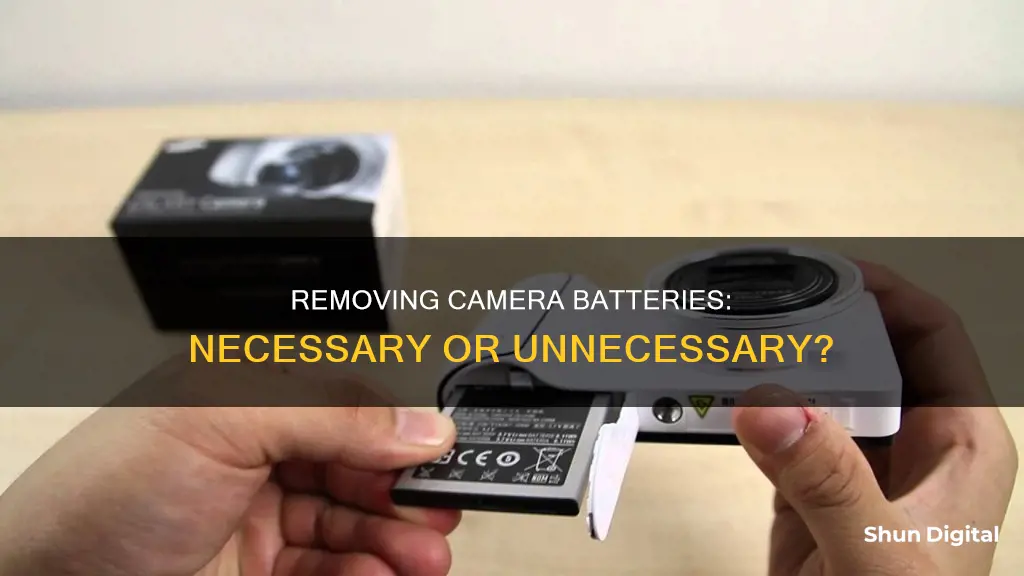
There are a variety of opinions on whether or not it is necessary to remove the battery from a camera when it is not in use. Some sources suggest that it is only necessary to remove the battery if the camera will not be used for an extended period of time, such as several months or years. Others recommend removing the battery when the camera is not in use to prevent the battery from losing its charge and to prolong its life. Additionally, removing the battery can help to prevent leakage, which can cause permanent damage to the camera. Ultimately, the decision of whether or not to remove the battery may depend on factors such as the type of battery, the frequency of camera use, and the storage environment.
| Characteristics | Values |
|---|---|
| How long will the camera be unused for? | If the camera will be unused for a few days, the battery can be left in. If it will be unused for a few weeks, opinions vary. If it will be unused for several months or years, the battery should be removed. |
| Type of battery | Alkaline batteries should be removed from the camera when it is not in use. Lithium batteries are fine to be left in the camera for a few days. |
| Camera type | Some cameras have problems where the battery is drained by the camera even when it is off. |
| Environment | In a very humid environment, it is best to remove the batteries if the camera won't be used for a couple of weeks. |
| Battery storage | Store batteries in a cool, dry place. |
What You'll Learn
- Leaving batteries in cameras for long periods can damage them
- Removing batteries is advised if the camera won't be used for a long time
- High-quality batteries are safe for a significant portion of their use-by date
- Non-rechargeable batteries in some equipment can't be removed
- Batteries should be stored in a cool, dry place

Leaving batteries in cameras for long periods can damage them
Leaving batteries in cameras for long periods can damage the device in several ways. Firstly, batteries can leak, causing corrosion and even eating through wires, which can be extremely damaging. This is more likely to happen with certain types of batteries, such as AA or AAA batteries, but it is still a risk with rechargeable batteries too.
Secondly, batteries can self-discharge and lose their charge over time, especially if they are exposed to heat. This can be mitigated by storing batteries in a cool, dry place, but it is still recommended to remove them from cameras if they won't be used for a long time. How long is too long? Well, that depends on the type of camera and battery, but a good rule of thumb is that if it won't be used for several months, take the batteries out.
Additionally, batteries can become unstable and overheat if they are left to fully discharge. Therefore, it is best to store them with a little less than half a charge.
Finally, batteries can be damaged by extreme temperatures, with high temperatures increasing the risk of explosion and low temperatures slowing down chemical reactions, which can affect camera performance.
So, to summarise, while it may not be necessary to remove camera batteries if the device is used regularly, it is definitely advisable to do so if the camera will be unused for long periods to prevent potential damage.
Mobile Camera Tricks: See-Through Clothes
You may want to see also

Removing batteries is advised if the camera won't be used for a long time
If you're not planning on using your camera for a long time, it is advisable to remove the batteries and store them separately. This is because rechargeable batteries lose power over time and can leak, causing irreparable damage to your camera.
High-quality batteries are generally safe for a significant portion of their use-by date, but if you're not planning on using your camera for several months, it's best to take them out. This is because the batteries can leak, and the longer they are left in, the higher the chance of this happening. Leaking batteries can cause corrosion and eat through wires, causing permanent damage to your camera.
It is also worth noting that some cameras have problems where the battery is drained by the camera even when it is turned off. If you have a camera like this, it is even more important to remove the batteries when not in use for long periods.
Additionally, batteries should be stored in a cool, dry place and should be charged and discharged at least once every six months to maintain their longevity.
Apple Watch Series 4: Camera Location and Functionality
You may want to see also

High-quality batteries are safe for a significant portion of their use-by date
When it comes to camera batteries, there are a few things to consider to ensure optimal performance and longevity. While some sources recommend removing batteries when the camera is not in use, others suggest that high-quality batteries are generally safe to leave in for a significant portion of their use-by date. Here are some insights to help guide your decision:
High-Quality Batteries: Safe for Short-Term Storage
Leaving high-quality batteries in your camera for a short period when not in use is generally safe. Quality batteries tend to have a lower self-discharge rate, which means they can retain their charge for longer. Additionally, modern rechargeable batteries, such as Li-ion batteries, can often withstand frequent charging and discharging cycles without significant performance issues. However, it is still advisable to keep spare batteries on hand, as rechargeable batteries gradually lose their power over time.
Long-Term Storage: Consider Removing Batteries
If you plan to store your camera for several months or longer, removing the batteries is highly recommended. This precaution is because all batteries experience self-discharge, gradually losing their charge over time, even when not in use. Additionally, the formation of a passivation layer on the battery's electrodes during extended storage can contribute to capacity loss and reduced efficiency. Therefore, if you anticipate that your camera will not be used for an extended period, it's best to take out the batteries and store them separately.
Proper Battery Storage Practices
To maintain the health of your camera batteries, follow these storage tips:
- Store batteries in a cool, dry place to prevent overheating and moisture damage.
- Avoid direct sunlight, as high temperatures can accelerate self-discharge and degradation.
- Keep batteries away from metallic items and other batteries to prevent short-circuiting.
- Periodically check the batteries and recharge them if necessary to maintain their performance.
- Label and date your batteries to keep track of their storage duration.
In summary, while high-quality batteries are generally safe for short-term storage in your camera, it is essential to follow proper storage practices to maintain their performance and longevity. For long-term storage, removing the batteries and storing them separately is highly recommended to prevent potential issues.
Strangers Behind a Wall: Megle Camera Conundrum
You may want to see also

Non-rechargeable batteries in some equipment can't be removed
Non-rechargeable batteries, also known as primary batteries, come in a variety of types, each with distinct characteristics and chemistries. While rechargeable batteries are often the preferred choice for frequently used devices, non-rechargeable batteries remain a practical option for certain equipment. Here are some reasons why non-rechargeable batteries in some equipment cannot be removed:
Compatibility and Design: Some devices are specifically designed to use non-rechargeable batteries. Replacing these with rechargeable batteries could lead to compatibility issues and potentially damage the equipment. Manufacturers take into account the voltage requirements and capacity of non-rechargeable batteries when creating certain devices, ensuring optimal performance and compatibility.
Convenience and Immediate Use: Non-rechargeable batteries offer the convenience of being pre-charged and ready for immediate use. This makes them ideal for devices that require a quick power replacement. For instance, in situations where a device's lifespan is shorter than the capacity of the non-rechargeable battery, it is more practical to use these batteries instead of rechargeable ones, which may not be fully utilized.
Long Shelf Life: Non-rechargeable batteries have a much longer shelf life compared to rechargeable batteries. When stored properly, they can retain their charge for several years. This feature is crucial for devices that may remain unused for extended periods, such as emergency flashlights, smoke detectors, or remote controls.
Reliability and Consistent Performance: Non-rechargeable batteries are known for their reliable and consistent performance. They provide a steady voltage output throughout their lifespan, which is essential for devices that require a stable power supply. The reliable performance of these batteries ensures that devices function optimally and reduces the risk of unexpected power loss.
Low Self-Discharge: Non-rechargeable batteries have a low self-discharge rate, meaning they lose minimal power when not in use. In contrast, rechargeable batteries gradually lose their charge over time, even when not in active use. This makes non-rechargeable batteries a practical choice for devices that are used infrequently or intermittently.
While rechargeable batteries are a popular choice for many devices, there are situations where non-rechargeable batteries are the only option or the more practical solution. These batteries offer convenience, longevity, and reliability, making them a preferred choice for specific equipment and applications. However, it is always advisable to check the manufacturer's recommendations and guidelines for battery usage and replacement to ensure the optimal performance and longevity of the device.
View QT Camera Footage on Your Alexa Show
You may want to see also

Batteries should be stored in a cool, dry place
It is advisable to remove batteries from cameras when they are not in use, especially if they won't be used for a long time. This is because rechargeable batteries lose power over time and can leak, causing damage to the camera.
Now, here are some detailed instructions on how and where to store your batteries:
Store Batteries in a Cool, Dry Place
Storing batteries in a cool, dry place is essential to prolong their life and ensure they are ready for use when needed. Room temperature is ideal, avoiding any extreme temperature fluctuations. Heat can damage batteries, causing fluid evaporation and subsequent battery failure. Cold temperatures can also form condensation, which can erode batteries over time. Therefore, it is best to avoid storing batteries in the freezer or refrigerator, as the moisture can be detrimental. Instead, opt for a climate-controlled environment to maintain stable temperatures and keep them away from direct sunlight or heat sources.
Additional Tips for Battery Storage
- Keep batteries in their original packaging or a designated container to prevent contact between the terminals and accidental short-circuiting.
- Avoid mixing old and new batteries to prevent reduced performance or damage.
- Keep batteries away from children and pets, especially small batteries that pose a choking hazard.
- Dispose of batteries safely according to local regulations, as they can contain toxic chemicals and cause fires if not handled properly.
- Consider using a battery organiser or container to efficiently store and protect your batteries, preventing them from rolling around and touching terminals.
- Regularly check your batteries and devices. Remove batteries from devices that won't be used for extended periods.
Accessing Yi Camera Footage on PC: A Step-by-Step Guide
You may want to see also
Frequently asked questions
No, it is not necessary to remove the camera battery if you're not using the camera for a few days. However, if you're not planning on using the camera for a week or more, it's advisable to take the batteries out and store them separately.
It is not necessary to remove the camera battery if you use your camera regularly. However, it is important to care for your rechargeable batteries properly. Avoid letting them fully discharge, and store them in a cool, dry place.
Not removing the camera battery can drain the battery and shorten its life. Additionally, if the battery leaks, it can damage the camera's electronics. However, the risk of leakage is very low with modern batteries.







